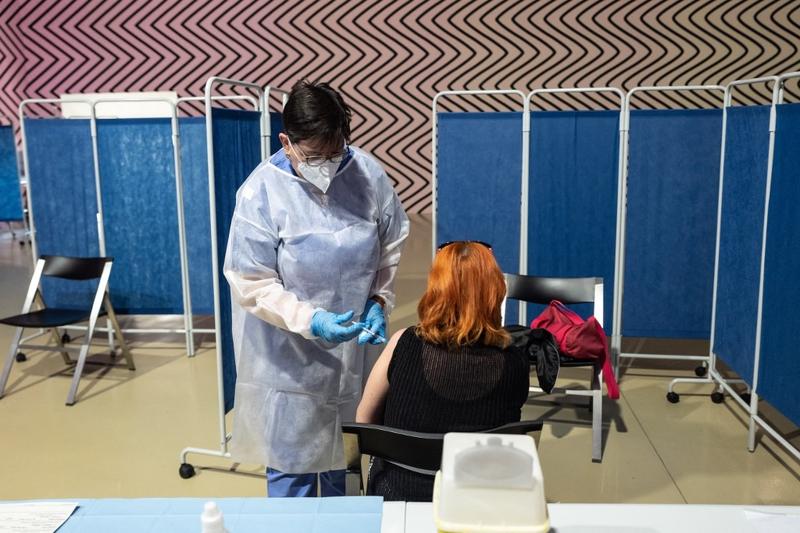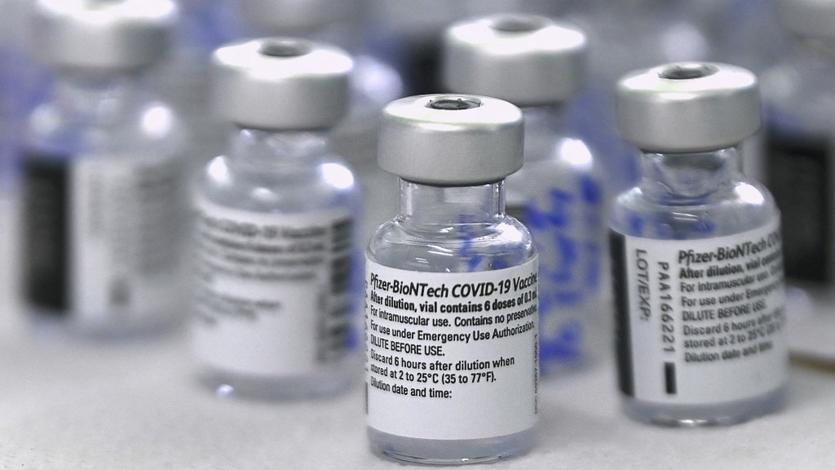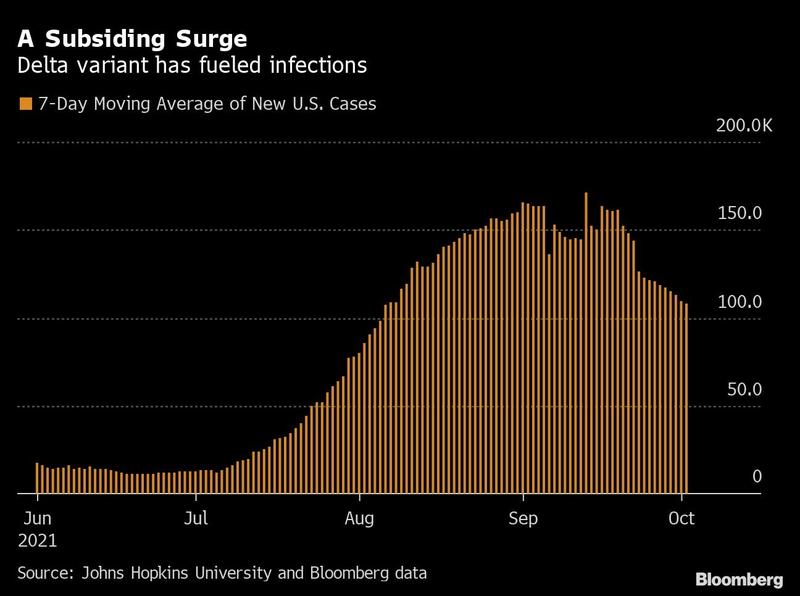 A medical worker vaccinates a patient with a dose of the Moderna COVID-19 vaccine at the Claudia Comte exhibition in the Museum of Contemporary Art "Castello di Rivoli", near Turin, Italy, on May 27, 2021. (MARCO BERTORELLO / AFP)
A medical worker vaccinates a patient with a dose of the Moderna COVID-19 vaccine at the Claudia Comte exhibition in the Museum of Contemporary Art "Castello di Rivoli", near Turin, Italy, on May 27, 2021. (MARCO BERTORELLO / AFP)
LONDON / MOSCOW / ADDIS ABABA / HAVANA / BUDAPEST / BERLIN / DAKAR / STOCKHOLM - The EU drug regulator said on Monday people with a severely weakened immune system may be given a third dose of COVID-19 vaccines made by Pfizer and Moderna at least 28 days after their second dose.
The long-awaited guidance comes after several EU member states launched their own booster campaigns, with a repeat shot given about six months after an initial two-dose course, although countries have come to widely different conclusions on who is eligible.
Italy, France, Germany and Ireland have already started to administer booster shots and the Netherlands plans to do so soon but only to people who are immunosuppressed.
Only 61 percent of the total population have been fully vaccinated, and only three countries - Malta, Portugal, Iceland - have vaccinated more than 75 percent of their total population, according to the EU's infectious diseases center.
ALSO READ: In a first, COVAX to send shots only to least covered nations
 In this file photo taken on March 4, 2021, vials of the Pfizer/BioNTech vaccine against COVID-19 are seen as elderly people are inoculated amid the novel coronavirus pandemic, at the Belisario Porras school San Francisco neighbourhood in Panama City. (LUIS ACOSTA / AFP)
In this file photo taken on March 4, 2021, vials of the Pfizer/BioNTech vaccine against COVID-19 are seen as elderly people are inoculated amid the novel coronavirus pandemic, at the Belisario Porras school San Francisco neighbourhood in Panama City. (LUIS ACOSTA / AFP)
BioNTech
Ugur Sahin, co-founder and chief executive officer of Germany’s BioNTech SE, which developed the first COVID-19 vaccine together with Pfizer Inc, said new strains will emerge that can evade booster shots and the body’s immune defenses, requiring the development of updated vaccine formulas.
“This year [a different vaccine] is completely unneeded, but by mid-next year, it could be a different situation,” the Financial Times quoted him as saying in an interview. “This is a continuous evolution, and that evolution has just started.”
Cuba
The numbers of daily COVID-19 cases, deaths, and hospitalizations in Cuba continued to decline amid the government's efforts to slow the spread of the pandemic.
On Sunday, the Caribbean nation added 4,097 new coronavirus cases and 46 deaths, marking the country's lowest daily tally and toll since July.
Currently, there are 23,832 active cases on the island with 358 patients in intensive care units, according to the Ministry of Public Health.
"We are seeing a downward trend in all indicators, but the numbers of coronavirus cases and related deaths are still high," said Francisco Duran, national director of epidemiology at the ministry, adding that the strict following of health protocols is essential to tackling the COVID-19 pandemic in Cuba.
So far, more than 80 percent of Cubans have received at least one dose of a coronavirus vaccine, according to the ministry.
The Caribbean nation will gradually begin to reopen schools, with high school seniors resuming in-person classes on Monday.
According to the Ministry of Tourism, Cuba will relax pandemic border control measures for incoming travelers from Nov 15.
Ethiopia
Ethiopia registered 697 new COVID-19 cases in the past 24 hours, taking the nationwide tally to 348,669 as of Sunday evening, the country's Health Ministry said.
The ministry said 47 more deaths and 713 new recoveries were also logged during the same period, bringing the total number of deaths and recoveries to 5,722 and 315,171, respectively.
The country has so far administered a total of 3,740,160 COVID-19 vaccine doses, according to the ministry.
 A man receives a Johnson & Johnson Janssen COVID-19 vaccine in a so-called 'Impfzug' (vaccination train) operated by Berliner S-Bahn in Gruenau near Berlin, Germany, on Aug 30, 2021, the start of a vaccination campaign on Berlin's circular Ringbahn railway. (TOBIAS SCHWARZ / AFP)
A man receives a Johnson & Johnson Janssen COVID-19 vaccine in a so-called 'Impfzug' (vaccination train) operated by Berliner S-Bahn in Gruenau near Berlin, Germany, on Aug 30, 2021, the start of a vaccination campaign on Berlin's circular Ringbahn railway. (TOBIAS SCHWARZ / AFP)
Germany
After Germany's Saarland was the first state to loosen health regulations in schools last week, Bavaria and Berlin followed suit and relaxed mask-wearing requirements on Monday.
Federal Minister of Education Anja Karliczek expressed understanding for the end of mandatory mask-wearing in schools.
"Wearing masks interferes with normal teaching and is stressful for students," she told the Rheinische Post newspaper.
Berlin is lifting the mask requirement for younger classes up to sixth grade, while Bavaria generally no longer requires masks to be worn in class. Other states such as Baden-Wuerttemberg and Saxony are considering similar steps.
Germany's seven-day COVID-19 incidence rate remained stable and increased only slightly on Monday to 64.7 cases per 100,000 people, from 64.2 cases on the previous day and 61.7 a week ago, according to the Robert Koch Institute (RKI) for disease control and prevention.
The number of daily COVID-19 infections in Germany was also only slightly above the level a week ago as 3,088 new cases were registered within one day, only 66 more than last Monday, according to the RKI.
Global tally
Coronavirus cases worldwide surpassed 234.89 million while the global death toll topped 4.80 million, according to data compiled by Johns Hopkins University.
ALSO READ: WHO: Most African nations missed vaccine milestone
Hungary
Hungary's COVID-19 deaths and new infections jumped over the weekend to their highest level since the start of the fourth wave of the pandemic, government data showed on Monday.
Health authorities registered 1,492 new infections and 31 deaths over the past three days, bringing the total number of cases to 824,876 and deaths to 30,230 since the start of the pandemic.
Although the latest figures are still well below those registered during previous waves, the data reflect a slowly worsening trend.
Based on latest data, 5.66 million Hungarians have been fully vaccinated against COVID-19 in the country of about 10 million, and 804,000 people have also received booster shots.
Hungary is entering the fourth wave of the pandemic without any meaningful restrictions on activity, with pubs, restaurants and schools open across the country. Mask wearing is only mandatory in hospitals and health care facilities.
 This March 6, 2021 file photo shows vials of Johnson & Johnson's COVID-19 vaccine at a pharmacy in Denver, the United States. (DAVID SALUBOWSKI / AP)
This March 6, 2021 file photo shows vials of Johnson & Johnson's COVID-19 vaccine at a pharmacy in Denver, the United States. (DAVID SALUBOWSKI / AP)
J&J
Johnson & Johnson is planning to ask US federal regulators this week to authorize a booster shot of its COVID-19 vaccine, the New York Times reported on Monday, citing officials familiar with the company's plans.
The US Food and Drug Administration (FDA) scheduled last week an Oct 15 meeting of its expert advisory committee to discuss whether to grant emergency use authorization for a booster shot of J&J's vaccine.
The regulator authorized a booster dose of the Pfizer Inc and partner BioNTech vaccine last month, for those 65 and older, people at high risk of severe disease, and others who are regularly exposed to the virus.
Rival Moderna Inc also submitted its application seeking authorization for a booster shot of its two-dose vaccine last month.
J&J did not immediately respond to a Reuters request for comment.
Russia
Russia has suspended public gatherings of over 3,000 participants in a bid to curb a new wave of COVID-19 infections, an official announced on Monday.
Mass gatherings would only be allowed in accordance with regulations issued by Russia's chief sanitary doctor, head of the country's consumer rights and human well-being watchdog Anna Popova said.
She stressed that it is vital to speed up vaccination to reach herd immunity, as Russia's total COVID-19 caseload has surged by 14 percent over the past week.
The official called the epidemiological situation "extremely tense" with the most significant increase in infections among the elderly.
Russia confirmed 25,781 new COVID-19 cases over the past 24 hours, taking the national tally to 7,612,317, the official monitoring and response center said Monday.
For three consecutive days, Russia has registered more than 25,000 cases daily, as it has been going through a new wave of infections since mid-September.
The death toll grew by 883, slightly down from 890 a day earlier, to 210,801. Recoveries increased by 14,526 to 6,740,491.
The capital Moscow reported 4,410 new cases, taking the city's caseload to 1,650,649.
Senegal
Senegal on Monday logged only two new daily COVID-19 infections, the lowest number since the pandemic reached the country and two months after the rate of new cases hovered at record highs, the health ministry said on Monday.
"Two cases were recorded today, the lowest ever recorded," said health ministry spokesperson Ngone Ngom. "They were in the past seven, 10 cases, but from the top of my head I think this is the lowest."
While the number of COVID-19 infections has been relatively low in Senegal compared with elsewhere, the West African nation is emerging from its deadliest wave yet. Twenty thousand of its 73,800 cases and 250 of its 1,860 deaths were recorded in July alone.
The country of around 17 million people is pressing ahead with vaccinations, but still has a long way to go.
Vaccinations have more than doubled since the start of July, with the country having administered since then around 730,000 of its total 1.25 million doses used so far.
Sweden
Sweden's Public Health Agency said on Monday it recommended the use of Pfizer-BioNTech's, Comirnaty vaccine against COVID-19 for children between 12-15, opting against rival Moderna's Spikevax.
The European Medicines Agency approved the use of Comirnaty in May, while Spikevax was given the nod for children over 12 in July.
"All in all, we see reason to choose the vaccine that we know the most about and that is most well-proven when it comes to vaccinating children between 12 and 15 years of age," Anders Tegnell, head of department and state epidemiologist at the Health Agency said.
The agency said there was more data about Comirnaty's use on children.
"That's why Spikevax is not recommended for the youngest age group in Sweden," the Agency said in a statement.
In September, the Agency said that children aged 12 and over would be offered a COVID vaccination starting Oct 11.
UK
Another 30,439 people in Britain have tested positive for COVID-19, bringing the total number of coronavirus cases in the country to 7,900,680, according to official figures released Sunday.
The country also recorded another 43 coronavirus-related deaths. The total number of coronavirus-related deaths in Britain now stands at 136,953. These figures only include the deaths of people who died within 28 days of their first positive test.

United States
Daily vaccinations in the US topped 1 million on Saturday for the first time in several weeks, helped by vaccine requirements and people getting booster shots, White House Chief of Staff Ron Klain said on Twitter.
The number includes 363,000 newly vaccinated people and 545,000 additional doses or boosters, according to Cyrus Shahpar, the White House director of COVID-19 data.
More than 5 million boosters have been completed in the US, Klain said.
The Centers for Disease Control and Prevention backed booster doses of the Pfizer Inc-BioNTech SE vaccine for certain groups of adults, including everyone 65 and older and long-term care residents, on Sept 24.
Separately, more people need to get vaccinated to keep infections on a declining trend, infectious disease specialist Anthony Fauci said. He also said that while the full-vaccination rate has reached 55 percent, the key risk is the 70 million eligible people in the US who haven’t gotten a shot.
“We certainly are turning the corner on this particular surge,” Fauci said on ABC’s This Week on Sunday. “The way to keep it down, to make that turnaround continue to go down, is to do what we mentioned: get vaccinated.”


